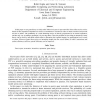Free Online Productivity Tools
i2Speak
i2Symbol
i2OCR
iTex2Img
iWeb2Print
iWeb2Shot
i2Type
iPdf2Split
iPdf2Merge
i2Bopomofo
i2Arabic
i2Style
i2Image
i2PDF
iLatex2Rtf
Sci2ools
ICPADS
2005
IEEE
2005
IEEE
Game Theory As A Tool To Strategize As Well As Predict Nodes Behavior In Peer-to-Peer Networks
In this paper we use game theory to study nodes’ behavior in peer-to-peer networks when nodes receive service based on their reputation. Reputation is used as a mechanism to incentivize nodes to share resources and provide services to others. The probability of a node obtaining service is directly proportional to its current reputation, and the only way to enhance reputation is by serving others. Thus, the problem of free-riding is minimized. Game theory can be used by individual selfish nodes to determine their optimal strategy for participation level in such a system. Moreover, game theory gives us interesting insight into the overall nature of nodes’ interactions and system efficiency, and how system efficiency can be improved.
| Added | 25 Jun 2010 |
| Updated | 25 Jun 2010 |
| Type | Conference |
| Year | 2005 |
| Where | ICPADS |
| Authors | Rohit Gupta, Arun K. Somani |
Comments (0)

